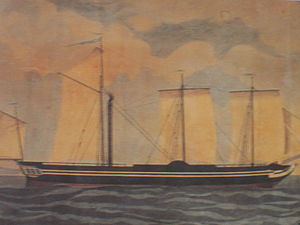Engineering:Kartería (Greek warship)
Karteria
| |
| History | |
|---|---|
| Name: | Karteria |
| Commissioned: | 1826 |
| Out of service: | 1831 |
| General characteristics | |
| Displacement: | 233 tons |
| Length: | 38.4 m (126 ft 0 in) |
| Beam: | 7.6 m (24 ft 11 in) |
| Propulsion: | steam paddles/sail |
| Speed: | 7 knots (under steam) |
| Crew: | 185 |
| Armament: | 4 68-pounder carronades, 4 68-pounder cannon |
Hellenic sloop-of-war Kartería (Καρτερία; Greek for "Perseverance") was the first steam-powered warship to be used in combat operations in history.[1] It was built in 1825 in an English shipyard for the revolutionary Hellenic Navy during the Greek War of Independence, on the order of Capt Frank Abney Hastings, a former Royal Navy officer who had volunteered his services to the Hellenic Navy.
The vessel was built by Daniel Brent Shipwrights in the Greenland South Dockyard, Rotherhithe, London.[2] It was financed mainly from the proceeds of the 2nd Greek Loan raised by the London Philhellenic Committee, but also by Capt Hastings' private funds.
The 233-ton vessel was propelled by steam-powered paddles. Power was generated by 2 small steam engines. The vessel also featured 4 masts and could operate under sail: it was envisaged that the vessel would normally cruise under wind power, but switch to steam-power during combat operations, to allow maximum maneuvrability. It was armed with just 8 guns but all were 68-pounders, the most powerful calibre. The on-board furnaces that burnt coal to generate steam could also be used to heat cannon-shot to a red-hot state, creating highly incendiary missiles.[3]
Active service
The ship entered service in Greece in 1826. It was the first steam warship to see combat. (The first steam warship ever built was American, the USS Demologos, a 30-gun armoured warship launched in 1814, but never used in battle).[4]
Under the command of Hastings, the Kartería soon gained a fearsome combat reputation, taking part in numerous operations against the Ottoman Navy. (The Karteria fired 18,000 rounds in 1827 alone). The ship's most celebrated success was a raid on the port of Itea, near Salona (Amfissa) in the Gulf of Corinth, on 29/30 September 1827, where it sank 9 Ottoman ships.[5]
References
- ↑ Sondhaus L. (2001) Naval warfare, 1815–1914, Routledge, London, N.York, p.20,
- ↑ Rankin, Stuart (July 2004). Shipyards, Granaries and Wharves, Maritime Rotherhithe, History Walk B. London: Southwark Council. ISBN 0-905849-37-X. http://www.southwark.gov.uk/download/1835/granaries_shipyards_and_wharves_information_booklet.
- ↑ Encyclopædia Britannica Online: article on F. A. Hastings
- ↑ C. M. Woodhouse The Battle of Navarino (1965) 29
- ↑ Woodhouse (1965) 83
External links
- "(1820–1840) Paddle steamer Karteria". A history of military equipment of modern Greece (1821-today). greek-war-equipment.blogspot.com. http://greek-war-equipment.blogspot.com/2011/02/1826-1840-paddle-steamer-karteria.html.
- Dimitri G. Capaitzis. "‘KARTERIA’ THE FIRST STEAM WARSHIP IN WAR (1826)". https://www.eefshp.org/wp-content/uploads/2020/05/Karteria-the-first-steamship-in-war.pdf.
 |



